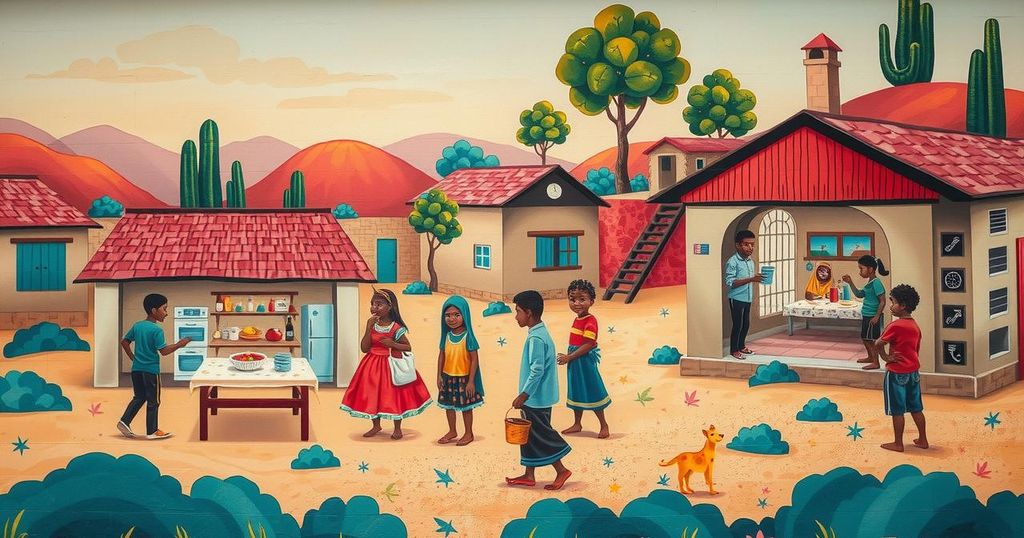Grassroots Activism: Sudanese Communities Rising Amidst Crisis
Communities in Sudan are stepping up amidst a crisis, providing vital services such as mental health care and support networks for displaced individuals. Grassroots activists have come together to fill the void left by collapsing state institutions, showcasing resilience and solidarity. While these efforts are facing numerous challenges, including violence and resource scarcity, they continue to persist and adapt to the needs of their fellow citizens.
In light of the continuous crisis in war-torn Sudan, communities are assuming responsibility for public services due to the collapse of state institutions. Many grassroots activists are providing indispensable support to families who remain in the country, helping them cope with the ongoing trauma through mental health services and volunteer networks focused on reuniting displaced individuals. Amid sporadic aid delivery and persistent violence, these efforts represent a significant source of resilience for the communities impacted by the conflict.
Maab Labib, a mental health professional and coordinator at a prominent emergency response room (ERR) in the capital, shared insights about their work: “We provide free mental health services to individuals and groups who are victims of war.” The psychosocial support team, which started soon after the conflict began, has expanded its operations to reach various regions of Sudan. Their approach combines virtual consultations with in-person group sessions while ensuring accessibility across demographics.
The challenges faced by caregivers are numerous; many service providers are also displaced and traumatized. Labib noted, “The service providers themselves are displaced and traumatized,” highlighting the difficulty in continuing efforts without adequate resources and safety. These workers offer peer support but constantly confront the fear of violence, emphasizing the precarious nature of their work.
In response to the situation, a network of mutual aid initiatives has emerged, such as communal kitchens and psychological first aid programs, illustrating the revolutionary spirit from Sudan’s past uprisings. Guido Lanfranchi, a research fellow, articulated the significance of these efforts, stating, “They are a beacon of hope, showing that people can come together to support each other even as the state collapses.”
However, these grassroots groups face increased risks; both government forces and military factions have targeted them, with allegations of collaboration with opposing sides emerging. Anette Hoffmann observed that mutual aid efforts are being undermined, often facing intimidation and legal challenges from both the Sudanese Armed Forces and the Rapid Support Forces.
The ongoing humanitarian need is staggering, with nearly half the population seeking aid according to the UN. The recent suspension of USAID programs and support has compromised essential services, necessitating local initiatives to absorb the increasing burden. Organizations like the Safe Haven Organization, which provides food and psychosocial support, have reported needing to expand their reach despite significant funding shortages.
Mozamul Mohammed Ali, project manager at Safe Haven, remarked on the organization’s pivotal role: “We supported 4,500 families a day through our kitchens,” but acknowledged that operational constraints have hindered their effectiveness. Their programs have had to evolve from solely offering food to include comprehensive health and mental health services.
The growing mental health crisis is particularly concerning, affecting many, especially women and children, as trauma-related disorders rise. Mohammed Abkar Goma explained, “There’s a significant rise in trauma-related disorders,” while also noting the stigma surrounding mental health care. To counteract this, the organization trains local community members in basic psychological first aid to provide immediate support to those in need.
Despite their resilience, grassroots leaders stress the necessity for vested support from the international community. As needs evolve beyond basic survival, organizations highlight the urgency for sustained assistance in health, education, and trauma care. Lanfranchi emphasized the efforts made by community groups: “These community groups are stepping in — not just to survive, but to resist fragmentation.”
The volunteers, driven by a profound sense of duty to their communities, remain committed to their mission amidst growing risks. Ali summarized their collective determination succinctly: “We just couldn’t watch our people suffer without doing something.” Their ongoing work encapsulates hope and endurance in the face of adversity, underlining the vital role of local initiatives.
Grassroots activism in Sudan exemplifies the indomitable spirit of communities enduring profound challenges. Amidst the collapse of state institutions and increasing violence, local volunteers are filling critical gaps by providing essential mental health and support services. Despite facing threats and limited resources, these initiatives reflect a resilient and unified response. They advocate for the necessity of international recognition and support to enhance their capabilities during a time of unprecedented need.
Original Source: www.arabnews.pk




Post Comment